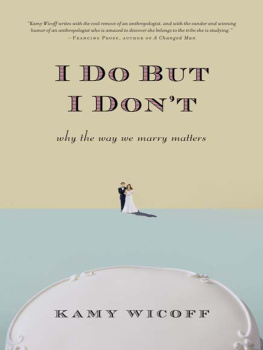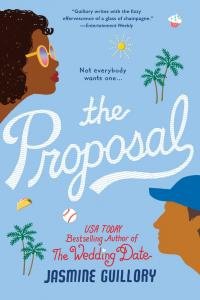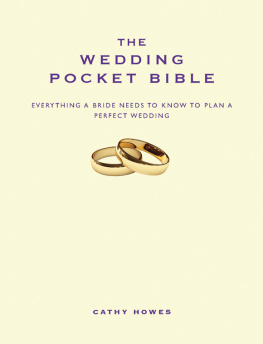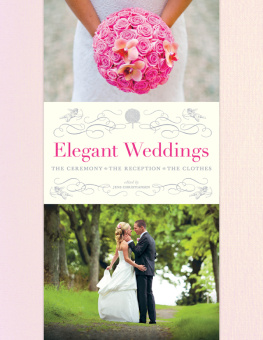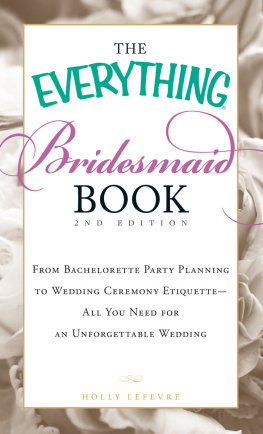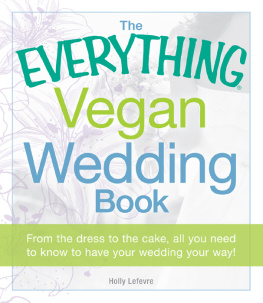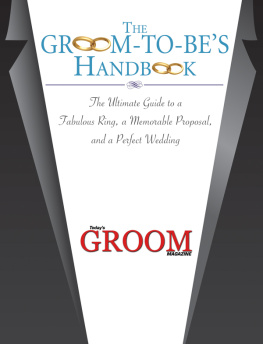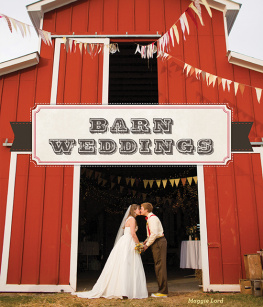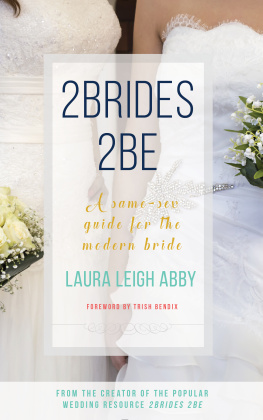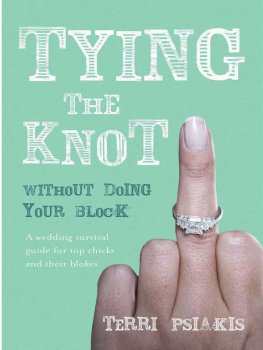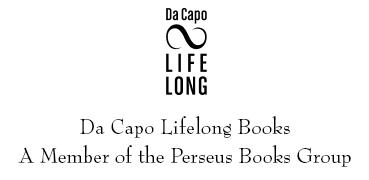INTRODUCTION
I will never forget the first time I saw myself in a proper wedding dress.I walked into the fitting room wearing jeans, boots, a T-shirt, and, believe it or not, green underwear. I emerged before a wall of brightly lit mirrors to see... a bride. The image knocked the wind out of me. Seeing myself clothed that way, with a veil, full skirts, and a long flowing train, seized me with emotions so unexpected, fierce, and complex that I was immobilized. Surprisingly, however, I have since come to value that moment for its clarity. When I walked out of that fitting room, I was totally, unavoidably disabused of the notionheavily advertised by every modern wedding magazine, website, and guidethat being a bride was about being myself. (The Knots Book of Wedding Gowns actually calls its shopping chapter Finding Yourself.) Instead I saw that being a bride was not about being myself, but about finding myself as a bride, because a bride is not an individual woman, but an icon of womanhood; a bride is not a person, but a thing.
Seeing myself transformed into a thing so symbolic, so timeless, and so utterly feminine enthralled me in a way I had never anticipated. But for an instant I allowed myself to acknowledge that it unnerved me in a way Id never anticipated, either. Something about playing the role of bride felt threatening, though I couldnt say what felt threatened, exactly, and I couldnt say why. Face-to-face with this vision of myself in bridal attire, however (recognizable no matter how unique the dress may be), a litany of questions rushed into my head for the first time that day. It rushed in with the force of things that have been forcibly held back: Can I be me and be a bride, too? What does being a bride mean? What is it asking of me? What am I asking from it?
Tears sprang to my eyes.
Its the wrong dress, said the friend with me that day, squeezing my hand.
It was the wrong dress. Hers was the voice of reasonor at least of wedding logicand I welcomed it. I felt wrong in it because it wasnt me. In the right dress, I would feel right. I had no desire to dig any deeper than that, and resolutely retreated back into the fog of denial that sustained me (sort of ) throughout my engagement. I was determined to have a big, beautiful, mostly traditional wedding no matter what, and I did.
T HIS is a book about my experience getting married. It is not a boymeets-girl story, however. It is a girl (and boy)-meets-culture storythe story of the head-on collision between individuals and societies that weddings bring about, and how American women my age, the daughters of baby boomers, are handling it. It is also the story of what women confront whenever they confront The Bride: a definition of womanhood that is narrower, more traditional, and more troublesome than many of them would like to admit. It is a difficult subject, more difficult than I knew when I began writing about it. For one thing, very few women (and I corresponded with more than eighty, some married, some not, ranging in age from twenty-three to forty-five, as they filled out the series of questionnaires I created regarding all things weddingy) are willing to acknowledge the idea that, in this modern era, any such thing as a definition of womanhood exists, and are even less inclined to acknowledge that such a definition has the power to dictate their behavior. In fact, the most fervent, consistently held belief the women I interviewed expressed was that in a post-feminist, post-sexual-revolution world, women are free to define womanhood themselves, making any discussion of the social and cultural pressures women experience as brides irrelevant and even insulting.
Feel funny in a white dress? the thinking goes, Then dont wear one!And if you do, youve forfeited your right to bitch about it! Case closed.
It is a testament to the power of this logic that despite having long been somewhat unusual in my continued and public embrace of feminism the f-word now eschewed even by many women who share feminist idealsI, too, believed I had the power to define being a bride, rather than be defined by it. And this belief kept me quietthough just barelyas I waited, humiliated, for my boyfriend Andrew to propose to me, because I was unwilling to propose to him. And this belief kept me from asking questions later when, affianced, I spent more money and time on my appearance than I ever had in my life, and was treated as though landing a man was the pinnacle of my career while Andrews manly, money-making career soldiered on... and so much more.
I clung to it largely because when it came to just about everything regarding my engagement and my wedding, I wanted to conform: to do it right, and do it well. I believed I could do this and preserve my modern, independent, feminist self because I was freely choosing it. If I chose to be a bride-by-the-book, I told myself, it would cost me nothing. Rightly convinced that nobody should tell me how to be a woman or a bride, I failed to see that anti-feminist backlash had ingeniously coopted this belief to convince me that nobody couldand if I let them, I had nobody but myself to blame. And falling into this syllogistic trap did cost me. Sometimes it cost me my sanity. More important, it cost me an invaluable chance to see the way I, my husband-to-be, and our relationship were, and always had been, products of our culture, and how we could meaningfully resist, embrace, or reconfigure that relationship for better, not for worse.

